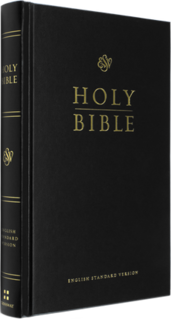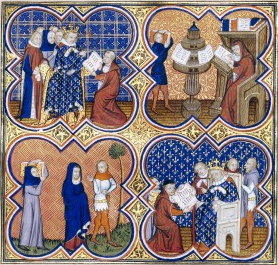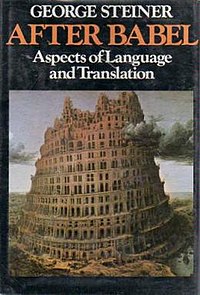
The King James Version (KJV), also the King James Bible (KJB) and the Authorized Version, is an English translation of the Christian Bible for the Church of England, which was commissioned in 1604 and published in 1611, by sponsorship of King James VI and I. The 80 books of the King James Version include 39 books of the Old Testament, an intertestamental section containing 14 books of what Protestants consider the Apocrypha, and the 27 books of the New Testament. Noted for its "majesty of style", the King James Version has been described as one of the most important books in English culture and a driving force in the shaping of the English-speaking world.

William Tyndale was an English biblical scholar and linguist who became a leading figure in the Protestant Reformation in the years leading up to his execution. He is well known as a translator of the Bible into English, and was influenced by the works of prominent Protestant Reformers such as Martin Luther.
International Sign (IS) is a pidgin sign language which is used in a variety of different contexts, particularly at international meetings such as the World Federation of the Deaf (WFD) congress, in some European Union settings, and at some UN conferences, at events such as the Deaflympics, the Miss & Mister Deaf World, and Eurovision, and informally when travelling and socialising.

Hermeneutics is the theory and methodology of interpretation, especially the interpretation of biblical texts, wisdom literature, and philosophical texts. Hermeneutics is more than interpretative principles or methods used when immediate comprehension fails and includes the art of understanding and communication.

Jean Paul Gustave Ricœur was a French philosopher best known for combining phenomenological description with hermeneutics. As such, his thought is within the same tradition as other major hermeneutic phenomenologists, Martin Heidegger, Hans-Georg Gadamer, and Gabriel Marcel. In 2000, he was awarded the Kyoto Prize in Arts and Philosophy for having "revolutionized the methods of hermeneutic phenomenology, expanding the study of textual interpretation to include the broad yet concrete domains of mythology, biblical exegesis, psychoanalysis, theory of metaphor, and narrative theory."

The English Standard Version (ESV) is an English translation of the Bible. The ESV was published in 2001 by Crossway, having been "created by a team of more than 100 leading evangelical scholars and pastors." The ESV relies on recently published critical editions of the original Hebrew and Greek texts.

Francis George Steiner, FBA was a Franco-American literary critic, essayist, philosopher, novelist, and educator. He wrote extensively about the relationship between language, literature and society, and the impact of the Holocaust. An article in The Guardian described Steiner as a "polyglot and polymath".
Translation studies is an academic interdiscipline dealing with the systematic study of the theory, description and application of translation, interpreting, and localization. As an interdiscipline, translation studies borrows much from the various fields of study that support translation. These include comparative literature, computer science, history, linguistics, philology, philosophy, semiotics, and terminology.

List of works by or about George Steiner.

Sheldon I. Pollock is a scholar of Sanskrit, the intellectual and literary history of India, and comparative intellectual history. He is currently the Arvind Raghunathan Professor of South Asian Studies at the Department of Middle Eastern, South Asian, and African Studies at Columbia University. He was the general editor of the Clay Sanskrit Library and is the founding editor of the Murty Classical Library of India.

Peter Constantine is a British and American literary translator who has translated literary works from German, Russian, French, Modern Greek, Ancient Greek, Italian, Albanian, Dutch, and Slovene.
Tina Kover is a literary translator. She studied French at the University of Denver and the University of Lausanne, Switzerland, and attended the Next Level Language Institute in Prague, Czech Republic. She holds a Master's Degree in Medieval and Renaissance Studies from Durham University.

Translation is the communication of the meaning of a source-language text by means of an equivalent target-language text. The English language draws a terminological distinction between translating and interpreting ; under this distinction, translation can begin only after the appearance of writing within a language community.
Technical translation is a type of specialized translation involving the translation of documents produced by technical writers, or more specifically, texts which relate to technological subject areas or texts which deal with the practical application of scientific and technological information. While the presence of specialized terminology is a feature of technical texts, specialized terminology alone is not sufficient for classifying a text as "technical" since numerous disciplines and subjects which are not "technical" possess what can be regarded as specialized terminology. Technical translation covers the translation of many kinds of specialized texts and requires a high level of subject knowledge and mastery of the relevant terminology and writing conventions.

Eugene A. Nida was an American linguist who developed the dynamic-equivalence Bible-translation theory and one of the founders of the modern discipline of translation studies.
Self-translation is a translation of a source text into a target text by the writer of the source text.

A Stranger in The Family: Culture, Families, and Therapy is a text written by Canadian cultural psychiatrist and family therapist Vincenzo Di Nicola integrating family therapy and cultural psychiatry to create a model of cultural family therapy.
Sense-for-sense translation is the oldest norm for translating. It fundamentally means translating the meaning of each whole sentence before moving on to the next, and stands in normative opposition to word-for-word translation.
Patrick Olivelle is an Indologist. A philologist and scholar of Sanskrit Literature whose work has focused on asceticism, renunciation and the dharma, Olivelle has been Professor of Sanskrit and Indian Religions in the Department of Asian Studies at the University of Texas at Austin since 1991.
Emily Susan Apter is an American academic, translator, editor and professor. Her areas of research are translation theory, language philosophy, political theory, critical theory, continental philosophy, history and theory of comparative literature, psychoanalysis, and political fiction. She is currently Silver Professor of French and Comparative Literature at New York University.












